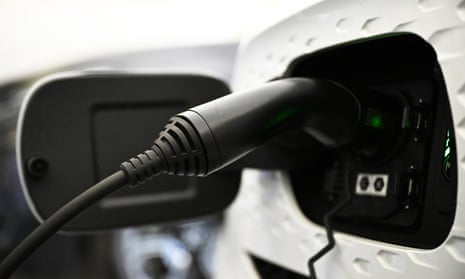Demand for electric cars will continue to outstrip supply despite the Albanese government’s push to make the vehicles more accessible, because the Australian market is not a priority for manufacturers, industry experts say.
“I think we’re going to get a whole lot of vehicles and they’re going to launch soon,” said Matthew Hobbs, director of policy at the Federal Chamber of Automotive Industries.
“But we still need to get to a position where we get more volume rather than just a couple of hundred or a couple of thousand.”
Australia has long received only a handful of the global EV supply, leading to slim choice, long waiting lists, and cars selling out in minutes.
Following Labor’s announcement of a national EV strategy and push to make the vehicles cheaper, a number of Australia’s car manufacturing representatives said they were reporting to parent companies that the country was finally progressing on incentivising the uptake of EVs.
But until Australia introduces a robust fuel efficiency standard – which could apply hefty fines if standards are not met – industry experts agree supply will continue to be prioritised to regions like Europe, the US and the UK.
“The developments so far are promising,” said Bill Thomas, the general manager of corporate communications at Hyundai Australia.
“But we can’t say it will lead to freeing-up supply that will meet the level of demand anytime soon.”
In March, the 109 electric SUVs Hyundai secured for Australia sold out in six and a half minutes. It is hoping Australia will receive around 2,000 of Hyundai’s IONIQ 6, which is launching next year.
Damien Meredith, the chief operating officer of Kia Australia, said the company would sell just over 1,000 EVs in Australia this year and 4,000 next year.
“We still won’t meet demand for our product, but it’s a far better outcome than it was in 2021,” he said. “It’s not going to change overnight because Australia started to get together legislation that appeals to the consumer.”
Australia is the only country in the developed world besides Russia without a fuel emissions standard. Last week, the government opened consultation on draft regulation which could pave the way for a standard in Australia after failed attempts by the previous government.
Behyad Jafari, the chief executive officer of the Electric Vehicles Council, said EVs were in hot demand globally and it was a race among countries to attract supply.
after newsletter promotion
EV numbers are also constrained by ongoing supply-chain issues. But still, Jafari said the UK, which has a new car market not that much larger than Australia’s, received 350,000 EVs last year whereas Australia received 20,000.
In the meantime, a number of new players have or will be entering the Australian market.
Car company BYD has been ramping up EV sales in Australia this year and will continue to do so, said Mark Harland the chief operating officer.
The Volkswagen Group will also launch what it is calling the first “relatively affordable” EV in Australia early next year. The CUPRA Born EV was expected to retail at around $60,000, which was “considerably less than comparative EVs on the market”, a Volkswagen spokesperson said.
The exact price – or how many will be sent to Australia – have not been confirmed, but CUPRA director Ben Wilks said the Albanese government’s proactive stance on EVs had helped it argue for increased supply.
When talking about increasing the supply of affordable EVs, Jafari said it’s important to note that this is mostly dependent on bolstering the second-hand EV market, given the majority of Australians don’t purchase new cars, and the cost of EVs remain prohibitive for many Australians.
This was noted by independent senator David Pocock who, when supporting the governments legislation to make EVs cheaper, said the decision to make the government car fleet electric will eventually help boost the second-hand EV market.
